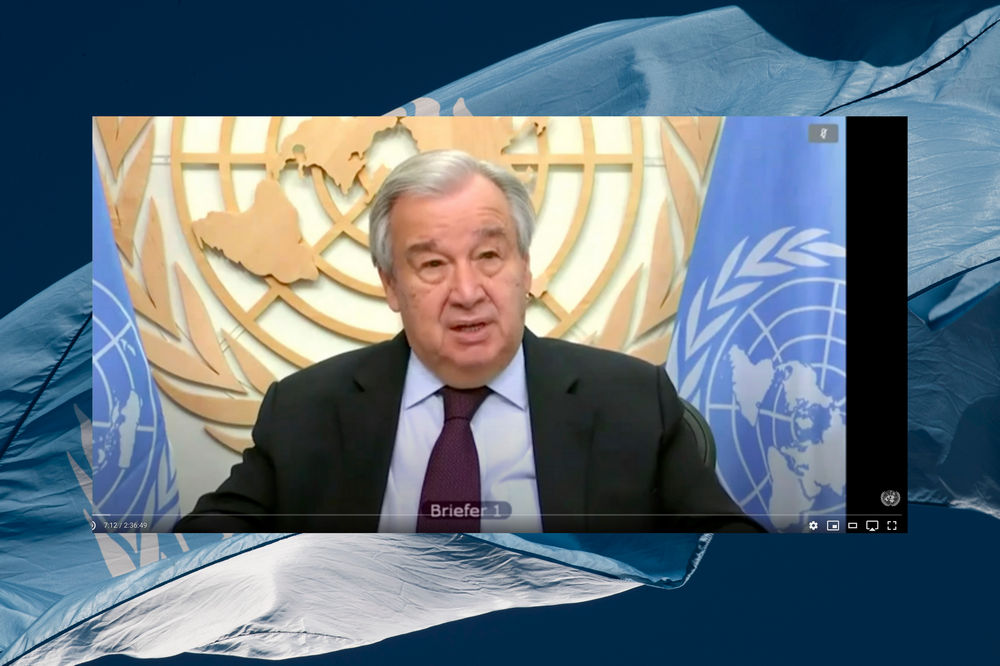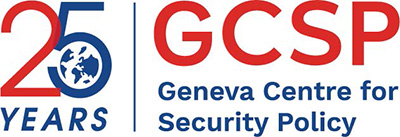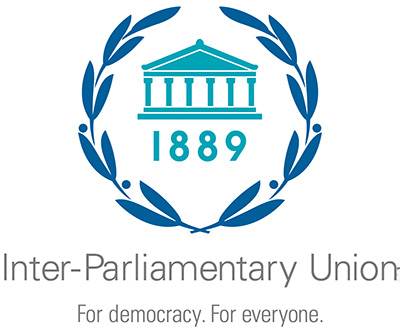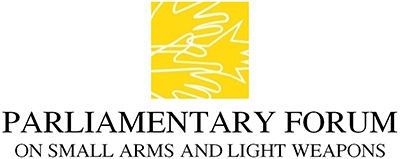This section focuses on parliamentary action on disarmament to support public health, peace and economic sustainability in relation to pandemic prevention, management and mitigation.

Our world is currently hit by a dreadful pandemic which will have important socio-economic consequences which add to the challenges facing the global community, in fact the whole of humanity, including future generations. The management of the pandemic and advancing general and complete disarmament are very much interlinked. Armed conflict and weapons proliferation impede our efforts to contain the pandemic and address its health and economic impacts. Parliaments, as institutions representing the people, will need to make progress on disarmament, non-proliferation, and arms control to protect public health, limit military spending and increase investment in the mitigation of the Covid-19 pandemic and the 2030 Agenda for Development in order to ensure people’s well-being.
Gabriela Cuevas Barron, IPU President (2017–2020).
Recommendations:
Parliamentarians can:
- Support the UN Secretary-General’s initiative for a global ceasefire;
- Support budgetary allocations to COVID-19 containment and management, and to economic recovery, and to consider reducing military budgets in order to liberate resources required to address the pandemic;
- Support a moratorium on military weapons production and supply during the pandemic;
- Support measures to strengthen the Biological Weapons Convention (including at the next Biological Weapons Convention Review Conference) in order to ensure prevention of virus outbreaks from military sources, and to enable more effective cooperation in addressing future pandemics regardless of whether they originated from military or civilian sources.
Relevant UN agreements, resolutions and initiatives:
- UNGA resolution 74/270: Global solidarity to fight the coronavirus disease, March 2020
- UNGA Resolution 74/274: International cooperation to ensure global access to medicines, vaccines and medical equipment to face COVID-19, March 2020
- WHA resolution 73/1. COVID-19 Response, May 2020
- UN Secretary-General’s initiative for a Global Ceasefire, March 2020
- Biological Weapons Convention, 1972
Examples of good parliamentary practice:
US Senate letter to invoke Defense Production Act of 1950
On March 15, 2020, US Senator Ed Markey sent a public letter to President Trump highlighting the lack of medical equipment and supplies to test US residents for COVID-19 and to treat those infected. Senator Markey proposed that the President invoke the Defense Production Act of 1950 to mandate increased industrial production of ventilators, masks, virus tests and other pandemic related medical supplies. The US Administration was originally reluctant to interfere in industry in this way, but relented to the growing congressional and public support for the measure, and so moved to invoke the Act on March 18.
Thailand: Cutting military budget to liberate resources to address COVID-19 pandemic
In September 2020, the National Assembly of Thailand adopted a budget allocation for defence and national security for B.E. 2564 (fiscal year October 2020 – September 2021) which was 2.23% lower than the defence and national security budget of B.E. 2563 (fiscal year October 2019 – September 2020) (425,513 mil THB). This trimming of the budget, focusing on the military works which are not urgent, was made to support a diversion of government funds to tackle COVID-19.
Women’s appeal for human security, public health, peace & sustainable development
On May 24, 2020, Parliamentarians for Nuclear Non-proliferation and Disarmament, Women Legislators’ Lobby and the World Future Council released a Women’s Appeal on Human security for public health, peace and sustainable development, endorsed by 250 women legislators, religious leaders and civil society leaders. The appeal expressed deep concern about the humanitarian and economic impact of the COVID-19 pandemic, supported the UN in its 75th anniversary year, including as a principle institution to assist nations in addressing the pandemic, underscored the key role of women in peace and disarmament, affirmed the importance of diplomacy, common security and law to address security issues rather than the threat or use of armed force or punitive sanctions, and highlighted the importance of cutting military expenditures in order to focus budgets on human security issues such as COVID-19, climate change and sustainable development.
The pandemic has undeniably demonstrated that key issues of human security cannot be resolved through military means, or independently by nations, but require global cooperation, diplomacy and peace. The United Nations, and its agencies like the World Health Organisation, and UN Environment Programme are vital for building such cooperation and peace. They must be better supported.
Alexandra Wandel, Executive Director, World Future Council
Our priorities are clear – It’s time to stop lining defense contractors’ pockets and spending vital taxpayer dollars on nuclear weapons. Instead, we must use the resources to support economic recovery from the pandemic. We will need global cooperation to rebuild our nations. Women legislators, religious leaders, and civil society organizations are championing the call for human security.
Jennifer Blemur, Director, Women Legislators’ Lobby
Global weapons freeze
In March 2020, in response to the UN Secretary-General’s initiative for a global ceasefire to better address the COVID-19 pandemic, the Strategic Concept for the Removal of Arms Proliferation (SCRAP) launched #FreezeWeaponsNow, a call on States, corporations and parliaments for a moratorium on the production and supply of military weapons. The call is supported by Pope Francis, Gabriela Cuevas Barron (President of the Inter-Parliamentary Union, 2017–2020) and many civil society organisations. The campaign includes a model resolution for parliaments.
United States: Defense Spending Reduction Caucus
In July 2020, Senators Bernie Sanders and Ed Markey introduced Senate Amendment 1788 to cut the US military budget by 10% and redirect this to support housing, education, and other vital human needs in communities in which the poverty rate is 25% or more. These are communities hit worst by the COVID-19 pandemic. Members of the House of Representatives Barbara Lee and Mark Pocan introduced a similar House Amendment (#HR562). Both amendments were lost. However, building on the strong support in the House, Lee and Pocan established a Defense Spending Reduction Caucus to ‘serve as an organizing point to continue demanding reductions to the Pentagon’s bloated defense budget.’
Wasteful defense spending does not make our communities safer – it only weakens our ability to respond to crises. Black and Brown people continue to be the ones that suffer most. We can’t keep spending billions for weapons while leaving our people defenseless against COVID. The Defense Spending Reduction Caucus will support our efforts to redirect wasteful defense spending toward investing in human needs.
US Representative Barbara Lee
UN global ceasefire initiative
On March 23, 2020, the UN Secretary-General launched an initiative for a global ceasefire in order to enable authorities to better contain the COVID-19 pandemic and address its health, social and economic impacts. The initiative included a political appeal to warring parties in armed conflicts to adopt a ceasefire, plus the engagement of Special Envoys in conflict zones to work with the parties to the conflict in order to facilitate agreement and implementation of ceasefires in the zones.
IPU joint statement supporting a global ceasefire
On April 10, 2020, the Inter-Parliamentary Union released a statement supporting the UN global ceasefire initiative, endorsed jointly by Gabriela Cuevas Barron, President of the IPU (2017-2020); José Ignacio Echániz, President of the IPU Committee on Peace and International Security; and Reinhold Lopatka, President of the IPU High-Level Advisory Group on Countering Terrorism and Violent Extremism.
Peace is crucial to secure our health systems, humanitarian assistance and to minimize the economic devastation around the world. Furthermore, terrorist groups should not be allowed to take advantage of this situation. We have to prevent the use of the coronavirus pandemic as a terror tool, utilized by extremist groups. That is why, we urge all warring parties to pull back from hostilities, comply fully with International Humanitarian Law and open a precious window for diplomacy… There should be only one fight in our world today: the shared one against COVID-19. This battle requires global unity, solidarity and cooperation. It is necessary to put health and the fight against the pandemic ahead and on the top of every country’s agenda. We have to end war and terrorism and fight the disease together.
IPU statement supporting the ceasefire initiative
A number of national parliaments and parliamentary groups have also expressed supported for the ceasefire initiative. Below are two examples:
Bahrain Parliamentary Group
The Kingdom of Bahrain and the Bahrain Parliamentary Group support the call made by António Guterres on the 23rd of March of this year for a “global cease-fire” in order to face the common enemy (Covid-19), which did not differentiate between nationality, race, faction or religion, but had rather relentlessly attacked everyone while conflict was raging in some regions of the world. Therefore, the Kingdom supports this initiative of an immediate global ceasefire in all parts of the world, and putting an end to armed conflicts and the cessation of all hostilities, thus helping the world focus on facing this common enemy, and contributing at the same time to paving the way for comprehensive, global and sustainable disarmament that eradicates wars.
Bahrain Parliamentary Group statement
Parliamentary Forum on Small
Arms and Light Weapons
We welcome Securing Our Common Future, the Disarmament Agenda launched by United Nations Secretary-General (UNSG) in 2018, and we call for warring parties around the world to agree to the UNSG´s appeal of March 2020 for a global ceasefire to help combat the Coronavirus pandemic. It should be accompanied with significant cuts in the production and trade of conventional weapons and small arms, with the goal of achieving sustainable world peace and reducing violence.
Hon. Daisy Lilián Tourné Valdez (Uruguay), President, Parliamentary Forum Small Arms and Light Weapons
Resources:
- How does COVID-19 relate to biological weapons? Marc Finaud, GCSP
- COVID-19 shows that the Biological Weapons Convention must be strengthened, Carlo Trezza, Former Italian Ambassador to the Conference on Disarmament
- PGA Campaign for Universality and Implementation of the Biological Weapons Convention (BWC) & Implementation of UN Security Council Resolution 1540 (2004)
INFO BOX 7:
Pandemics and the Biological Weapons Convention
The Biological Weapons Convention (BWC) was adopted primarily to confront the threat of deliberate deployment of such weapons by rogue States. It is supported by UN Security Council Resolution 1540, which was adopted to prevent the spread of biological, chemical or nuclear weapons to non-State actors. Most disarmament treaties establish verification, enforcement and technical support measures that ensure compliance with the treaty and provide other spin-off benefits. The Comprehensive Nuclear-Test-Ban Treaty Organisation, for example, established an international monitoring network that can detect whether a seismic incident is a nuclear test, or an earthquake or other event. The network can also give advance warning of Tsunamis in the case of earthquakes, and provide information on radiation dispersal from nuclear accidents such as the Fukushima accident.
If the BWC had established a system for verifying the treaty, that system could have been used early in the COVID-19 pandemic to help the WHO determine the nature of the virus, determine whether or not the virus had a military origin, and assist in developing proper virus containment measures. The problem is that the BWC has not established such a verification system. The COVID-19 pandemic has highlighted the need for the BWC to be strengthened in both verification and compliance measures in order to ensure a better global response to biological incidents such as novel viruses, regardless of whether these emerge from military or non-military sources.
Parliamentarians can support the adoption of such measures, especially as part of the BWC Review Conferences (see Chemical and biological weapons).
INFO BOX 8:
Comments by UN Secretary-General António Guterres to the UN Security Council on the COVID-19 pandemic and the Biological Weapons Convention

JULY 2, 2020
‘The pandemic also highlights the risks of bioterrorist attacks, and has already shown some of the ways in which preparedness might fall short if a disease were to be deliberately manipulated to be more virulent, or intentionally released in multiple places at once. So, as we consider how to improve our response to future disease threats, we should also devote serious attention to preventing the deliberate use of diseases as weapons.
The Biological Weapons Convention codifies a strong and longstanding norm against the abhorrent use of disease as a weapon, and now has 183 States Parties. I urge the 14 States that have not yet joined the Convention to do so without any further delay.
We also need to strengthen the Convention, which lacks an oversight institution and contains no verification provisions, by enhancing its role as a forum for the consideration of preventative measures, robust response capacities and effective counter-measures. Fortunately, the best counter to biological weapons is effective action against naturally occurring diseases. Strong public and veterinary health systems are not only an essential tool against COVID-19, but also an effective deterrent against the development of biological weapons.
All of these issues must be on the agenda next year at the Convention’s Review Conference. At the moment, the Secretary-General’s Mechanism, established by the General Assembly and endorsed by the Security Council, is the only instrument that provides a framework for an investigation of alleged use of biological weapons. Security Council Resolution 1540 and its follow-ups remain a key component of the international non-proliferation architecture, and have provided an overarching framework to prevent the nightmare scenario of bioterrorism.
Given the speed at which pathogens spread in an interconnected world, we must ensure that all countries have resilient and appropriate capacities to respond quickly and robustly to any potential global and deliberate biological event….’
Full speech by the UN Secretary-General.






